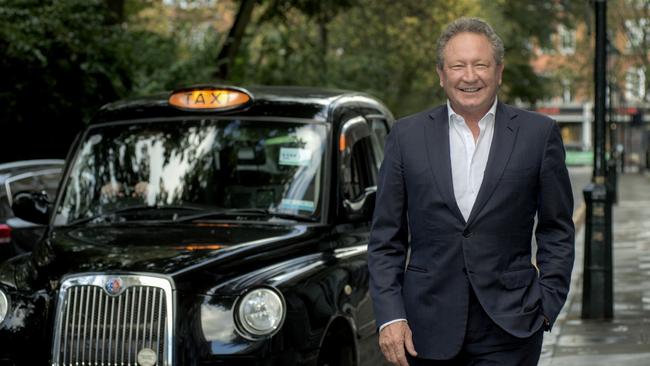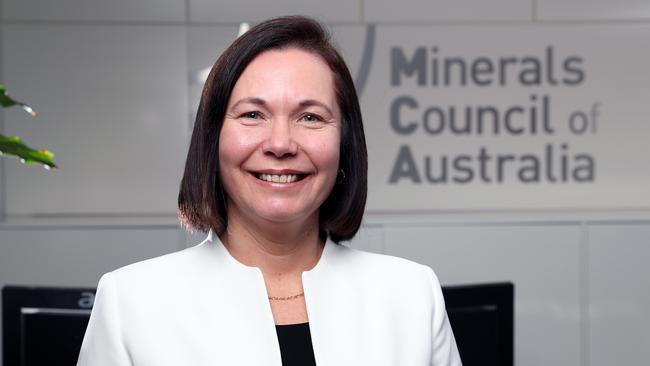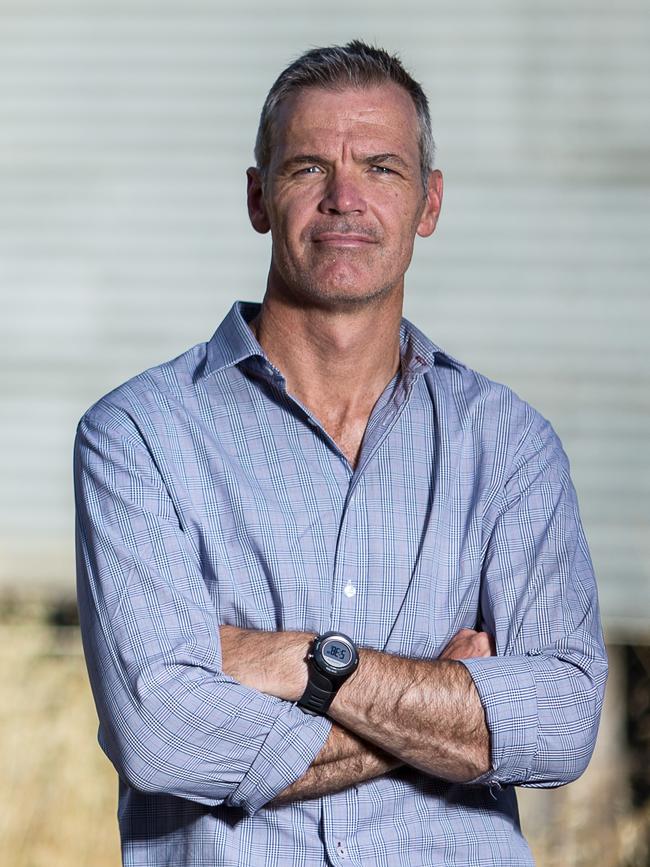Mining and farming industries savage Andrew Forrest’s bid to phase out fuel credit system
Andrew Forrest lobbied in Glasgow to phase out the diesel fuel rebate but still received short shrift from mining and farming groups.

Andrew Forrest raised the need to phase out the diesel fuel rebate with Australian corporate heavyweights attending the COP26 climate conference in Glasgow, amid a frenzied lobbying effort to win support for stronger moves to reduce Australia’s carbon emissions.
But Dr Forrest’s push to wind down the fuel credit scheme still received short shrift from mining and farming industry groups on Monday, with even major Fortescue investors raising concerns about the push.
The Australian revealed on Monday that the Fortescue Metals Group chairman approached Scott Morrison directly about a five-year phase-out of the credit from 2025.
The plan is believed to be targeted at only the nation’s biggest diesel users — with farmers and small to medium-sized businesses exempted from its removal.
Dr Forrest is believed to have taken the proposal directly to the Prime Minister, as well as to Nationals leader Barnaby Joyce and Labor leader Anthony Albanese, in a bid to win broad support for the plan ahead of next year’s federal election.
The Fortescue chairman is also understood to have raised the issue in discussions at a function attended by senior executives of Australian companies, including Rio boss Jakob Stausholm and BHP chief commercial officer Vandita Pant, at the COP26 climate summit in Glasgow.
When contacted, a spokesperson for Dr Forrest said that, generally speaking, Dr Forrest has “cooperative relationships with all, and has wide ranging productive discussions with many stakeholders”.
“We don’t disclose private discussions. Dr Forrest believes that phasing out the diesel fuel subsidy would give Australians the choice between Australian made, pollution free fuel and foreign imported, polluting diesel fuel,” she said.
But mining and farming groups — and even some Fortescue investors – reacted savagely to news of the proposal on Monday, describing the push to phase at the $7.8bn fuel tax credit as “ridiculous” and a “fantasy”.
Minerals Council of Australia chief executive Tania Constable told The Australian that the “ridiculous proposal” would cost jobs and slow investment in the sector.
She said there was currently no commercial alternative to diesel to power heavy machinery in most industries, and no certainty one would emerge by 2025, when Dr Forrest wants to begin the phase-out of the tax credit.

The rebate refunds excise on diesel fuel for businesses such as mining companies that run vehicles and heavy equipment on private roads.
It also applies to diesel used for electricity generation, such as power plants on remote mining sites, and a partial rebate exists for some heavy transport vehicles that use public roads and also pay a road user charge.
“This would be a big new tax that would affect regional industries and that would cost 1000s of jobs across numerous industries,” she said.
The National Farmers Federation also ridiculed Dr Forrest’s plan, even though the mining magnate is understood to have proposed a carve-out for farmers.
National Farmers’ Federation chief executive Tony Mahar said removal of the rebate was a “bad policy that would damage livelihoods in country areas”.
“Fuel tax credits exist to fix a serious distortion in the tax system. Taxing farmers every time they start their tractor, pump or generator makes no sense,” he said.
A political backlash against Dr Forrest’s plan was all but inevitable, but news of the proposal has also raised the hackles of institutional investors in both Fortescue and the broader sector.
Fortescue is believed to claim about $300m a year in fuel rebate, with BHP and Rio likely to claim fair higher amounts.
One major institutional fund manager, who declined to be named as he is not authorised to speak to the media said he had serious concerns about the impact of Dr Forrest’s proposal.
“We’d have serious concerns if any director was found to have lobbied to increase taxes payable by their company and worsen the competitiveness of Australian miners versus overseas rivals,” he said.
Fortescue chief executive Elizabeth Gaines said the mining major was getting on the front foot to mitigate any impact on its business from potential changes in market demands and government policy.
“As part of our commitment to be carbon neutral by 2030 and in line with the global transition to green energy, Fortescue is taking a forward looking strategic position to mitigate against future changes including any decisions by the Commonwealth Government relating to a potential phased removal of the diesel fuel rebate,” she said.
“This includes investment in renewables and new decarbonisation technologies to progressively eliminate the need for diesel in our mining fleet.”

Dr Forrest describes the fuel rebate as a fossil fuel subsidy, a description hotly contested by industry groups, and is understood to have argued that about 70 per cent of the fuel rebate is claimed by only a small group of companies.
The mining magnate is believed to have argued to government that phasing out access to the scheme to big diesel fuel users would deliver an additional $5bn to $7bn to the federal budget bottom line.
That cash could then be used to instead support the “retooling” of regional Australia to accelerate the deployment of green energy and transport options such as hydrogen and ammonia.
But Mr Forrest’s push appears to have fallen on deaf ears in Canberra.
Resources Minister Keith Pitt ruled out changes to the diesel fuel rebate.
“We won’t be changing the diesel fuel rebate,” Mr Pitt said.
“Mr Forrest is entitled to his view and if he wants to take action he can just stop claiming it to his companies right now. He doesn’t need any change in policy from the federal government.”
Opposition resources spokeswoman Madeleine King said it was “not Labor’s policy to change the current diesel rebate”.
Deputy Nationals leader David Littleproud said the rebate was “not a subsidy”.
“It’s a rebate to those users that don’t use public roads, and the machinery they use, whether that be mining or agriculture,” he said.
“We’re saying that if you don’t use those roads and you’re fuelling up your machinery with diesel, then the excise that would go to building those roads, we are giving you a rebate because you’re not using them.
“That just makes sense, and it’s about making sure that our mining industry, our agricultural industry is competitive.”
Mr Littleproud said “Twiggy Forrest is giving plenty of gratuitous advice from the sidelines”.
“He’s been running around the world cashing a lot of Fortescue cheques on hydrogen,” he said.
The boss of the Association of Mining and Exploration Companies, which represents smaller mining groups, Warren Pearce said his members opposed any changes to the fuel credit system.
“Our industry supports the development of hydrogen fuel sources as a way to help our industry and the world decarbonise,” he said.
“However, right now, hundreds of exploration and mining companies have no choice to use anything other than diesel for mobile and remote operations. The diesel fuel rebate provides critically important support for these small industry players and we are absolutely opposed to any change to the rebate.
“Once hydrogen fuel sources, and the infrastructure to support them have been developed these companies will quickly transition from diesel, but until that happens and these new technologies are available they have no choice.”




To join the conversation, please log in. Don't have an account? Register
Join the conversation, you are commenting as Logout